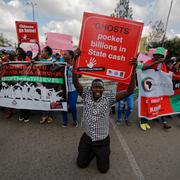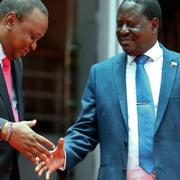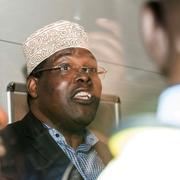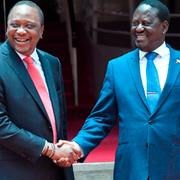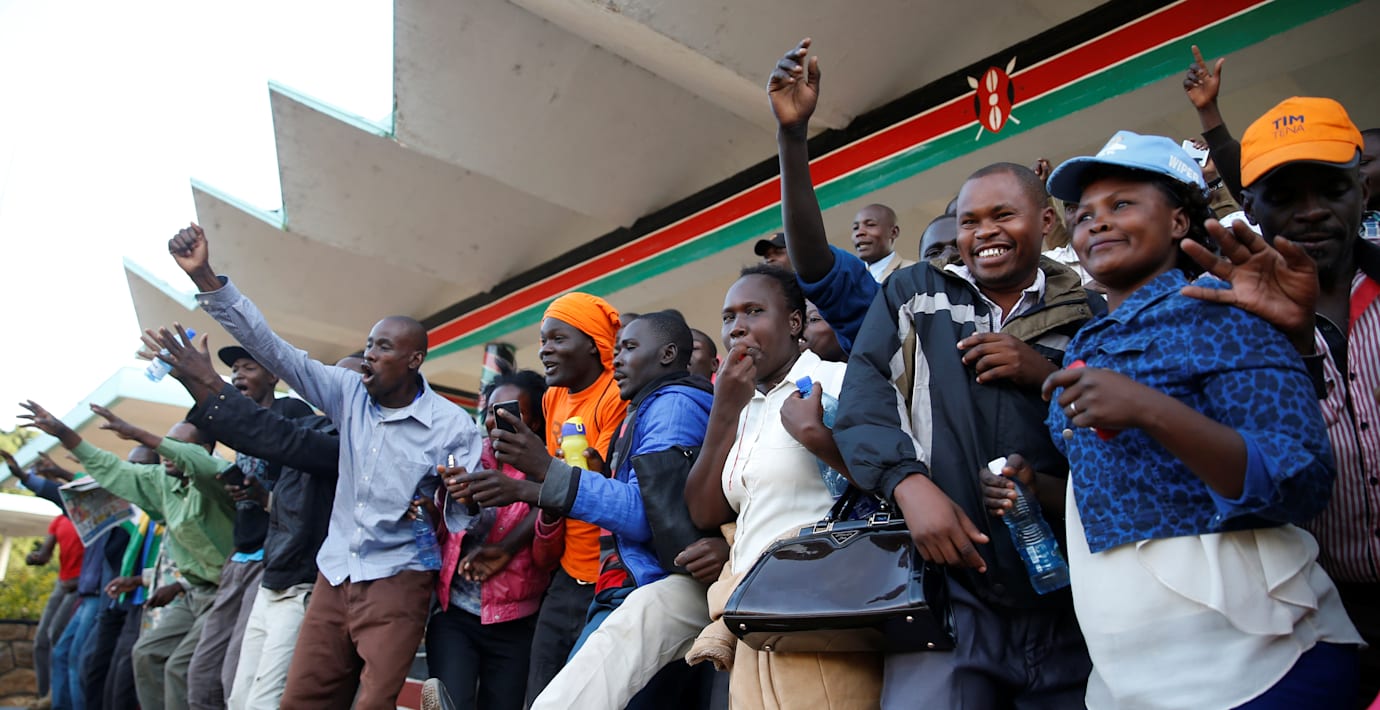
Stoppar oppositionsgrupp efter Odingas utspel
Efter att den kenyanske oppositionsledaren Raila Odinga i dag svor in sig själv i en ”alternativ presidentceremoni” har regeringen förklarat oppositionsgruppen, Nationella motståndsrörelsen, NRM som en ”kriminell grupp”. Det rapporterar flera nyhetsbyråer. Regeringens agerande öppnar upp för gripanden av medlemmar av oppositionsrörelsen.
Den sittande presidenten Uhuru Kenyatta valdes i november 2017 till president för en andra mandatperiod, i ett omval som Raila Odinga efter mycket om och men bojkottade. Oppositionsledaren anser att valet var riggat.
Tusentals människor samlades i centrala Nairobi för att bevittna Odingas ceremoni i dag. Polis uppges ha avfyrat tårgas mot anhängare som befann sig på platsen.
Raila Odinga
Wikipedia (en)
Raila Amolo Odinga (born 7 January 1945) a former prime minister who was first elected as the Member of Parliament for Langata in 1992, serving as Minister of Energy from 2001 to 2002 and as Minister of Roads, Public Works, and Housing from 2003 to 2005. He was the main opposition candidate in the 2007 presidential election, running against incumbent Mwai Kibaki. Following a violence-marred election and post-poll crisis, Odinga was appointed Prime Minister in April 2008 in a power-sharing deal with Mwai Kibaki, serving as Supervisor and Coordinator of a national unity coalition government. In the subsequent presidential election 5 years later he placed second against Uhuru Kenyatta, garnering 5,340,546 votes, which represented 43.28% of the total votes cast. He made another run for the presidency in August 2017 against Uhuru Kenyatta and lost after the chairman of the electoral body declared Uhuru Kenyatta as the winner with 54% of the votes cast to Raila's 43%. This outcome was later annulled by the Supreme Court following findings that the election was marred by "illegalities and irregularities." A subsequent fresh election ordered by the Court was however won by Uhuru Kenyatta when Raila declined to participate citing inadequate reforms to enable a fair process in the repeat poll.
Son of the first Vice President of Kenya, Jaramogi Oginga Odinga, draws a large chunk of his support base from most regions in Kenya, most notably the Coastal Region and his native former Nyanza province. Raila is commonly known as "Baba", due to coincidence: he was an MP at the same time as his father between 1992 and 1994.
Raila Odinga first ran as a presidential contender in the 1997 elections, coming third after President Daniel arap Moi of KANU and Mwai Kibaki of the Democratic Party. He contested for President again in the December 2007 elections on an Orange Democratic Movement (ODM) ticket.
In readiness for that poll, on 1 September 2007, Raila Odinga was picked as ODM's presidential nominee to face off with PNU's Kibaki in the current General Election. He managed to garner significant support in the 2007 general election. According to the electoral body at the time (the ECK), he swept the majority of the votes in Rift Valley (Kenya's most populous area), Western, his native Nyanza, and Coast. Kibaki on the other hand won majority votes in Nairobi (the capital), North Eastern province, Central province and Eastern province, taking 4 provinces against Raila's 4. Raila's ODM party got 99 out of the 210 seats in the parliament, making it the single largest party in parliament.
The Kriegler report, commissioned to investigate the violent aftermath of the 2007 elections and alleged vote-rigging, stated that about 1.2 million dead voters existed in the voters register, raising serious doubts to the integrity of the election.
On 30 December 2007, the chairman of the Kenyan election commission declared Raila's opponent, incumbent president Kibaki, the winner of the presidential election by a slim margin of about 230,000 votes. Raila disputed the results, alleging fraud by the election commission. However he refused to follow due process of petitioning the courts, believing that the courts were under manipulation by Kibaki and so could not give a fair and impartial hearing.
Most opinion polls had speculated that Odinga would defeat the president, though the margin kept narrowing as election day neared. Independent international observers have since stated that the poll was marred by irregularities in favor of both PNU and ODM, especially at the final vote tallying stages. Many ODM supporters across the country rioted against the announced election results, triggering the worst national violence in post-independent Kenya.
Besides his own father, Jaramogi Oginga Odinga, Raila is identified as one of the leading forces behind the democratization process of Kenya, particularly during the repressive regime of President Daniel arap Moi (1978-2002) and the lead-up to the adoption of the new Constitution (2010) that re-affirmed many formerly neglected fundamental rights.
Despite his failed bids to win the presidency, Raila remains a towering figure in Kenyan politics; his name and influence in the Kenyan political scene remains formidable, even though he has also elicited passionate loathe and enmity in some quarters, particularly from leading figures in the ruling administration, past and present. Raila Odinga is seen by many Kenyans as a forward-thinking and strategic leader.
On 27 April 2017, Raila was endorsed by the National Super Alliance (NASA) coalition as its presidential candidate for the 2017 Kenyan presidential election, with Kalonzo Musyoka as his running mate.
On 8 August, Raila vied again for the presidency but Uhuru Kenyatta was declared a winner. However, he later petitioned the Supreme Court which made a finding that the election was not validly conducted and ordered a fresh election. Despite the Supreme Court ruling, Odinga announced on 10 October 2017 he would withdraw from the second Presidential election creating unprecedented crisis in the country.
Omni är politiskt obundna och oberoende. Vi strävar efter att ge fler perspektiv på nyheterna. Har du frågor eller synpunkter kring vår rapportering? Kontakta redaktionen
